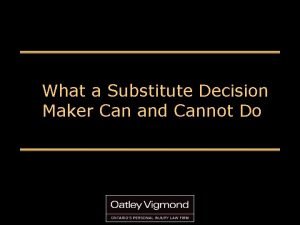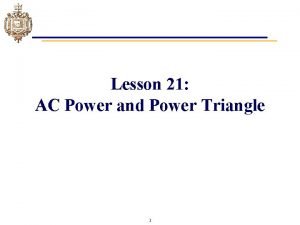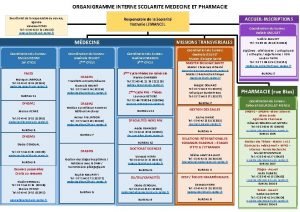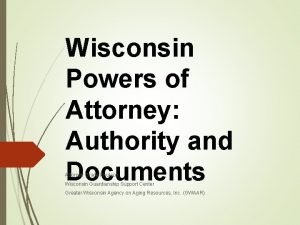Ciurlik Marion A power of attorney and representation










- Slides: 10

Ciurlik Marion A power of attorney and representation in France : French Civil Code from art 1984 to art 2010

Definition ● ● Problem → Power of attorney translation's in French : - « Mandat» (mandate) ● - « procuration» ● - « délégation de pouvoir » (delegation of power) ● Important economic tool ● Mechanism of conventional representation it exist also a legal mecanism of representation (parents, tutor. . ) ●

Different kind of power of attorney Special law / Common law Movement of specialization because of the changement into a contract for pecuniary ● ● Many special statute, special law , special mandate ex : special power of attorney for real estate agents, tourism agent, insurance agents or commercial agents. . ● The common law of power of attorney will be more and more poor and empty in French law ● ● We will study especially the mandate or procuration ● 1) The qualification of this contract ● 2) the conclusion of this contract ● 3) the effect of this contract

I) The qualification ART 1984 CC : « …. give the power to an other people to do something with his name» ● ● 3 elements should be present : ● 1 → acccomplishment of legal act ● to preserve the difference between mandate and the other kind of contract ( « courtage » and « contrat d'entreprise » ) 2 → the « mandataire » or the agent act in the name and on behalf of another person ● is it possible to have a mandate without representation ? No, it is the difference between the mandate and an other kind of contract : the « comission » ● ● 3 → absence of subordination : ● the agent can be an employee of the principal or of the third people ● Exception : VRP → employee and agent in the same time

2) The conclusion : 1) substantive requirements : ● A) - the legal act to accomplish should be determinate or determinable → difference between the mandate made with general terms (power to mad just administration act) and the express mandate (all the act) : art 1988 CC ● → difference between special mandate (power to made special act) and general mandate (power to manage all the business) : art 1987 CC ● B) – the fees of the agent « mandataire » : ● art 1986 CC : « the power of attorney is normally conclued as a gratuitous contract » . ●Spirit of Civil Code : charitable contract : no salary for the « mandataire » or attorney-in-fact ●Now : the Attorney-in fact can collect fees, « honoraires » ●But the fees can be change by the judge if he thinks that they are too much expensive. ●

The conclusion ● 2) the formal requirements : ● Principle for all contracts : consensualism ● no special form required (oral, written or tacit) ● exception : in a special mandate as for the real estate agent ● Question of the apparent mandate : without the will of the contractors Cours de cassation : ASS : 13 december 1962 : possibility to have a tacit contract if the third party thinks legitimy he is the « mandataire » or the agent. ● ●

3) effects of the contract ● 1) effects between parties ● A- Agent's ( « mandataire » ) obligations : ● - Agent 's personal execution of the mission - the agent should respects loyally the limit of power provided by the contract ● - debate : obligation of means or obligation of result ? ● - Art 1993 CC : the agent should inform the principal about what is accomplish and he received ● ● B) The principal's ( « mandant » ) obligation : The principal should give all the information, documents, helps in order to acheive the contract the mandate is a relationship base on trust. - - - obligation of refund and compensation - obligation to pay the agent ? Possible to pay or not, or possible to pay just in case of sucess -

Effects of this contract : 2) Effects on other people : Relationship between the agent ( « mandataire » ) and the third parties( « tiers » ) : • If the agent respect the limit of his power : -He is not engaged to third parties ( « tiers » ) : no contractual relationship -If he comits a tort : tort relationship between the agent and third parties A) If the agent did not respect the limit of power : Tort relationship between the agent and third parties : he should compensate , remedies Exception if the third parties knows that the agent exceed his power • B) Relationship between the principal ( « mandant » ) and the third parties : Art 1998 CC : -if the agent respect the limit of power : contractual relationship between the principal and third parties -If the agent exceed his power : no contractual relationship between the principal and third parties exception : if the principal ratified an act after the conclusion of the contract

4) The end of this contract: Principle for classical contract : the contract finish when the both parties want to stop the contract → consensualism → art 1334 al 2 CC But it is an exception for the mandate → possible to stop contract with just the will of one party : 2 ways to stop the contract : - by the waiver of the agent ( « mandataire » ) - by the revocation of the principal ( « mandant » ) 2 reasons : - trust between both parties - intuitus persnae contract

Thanks !



















